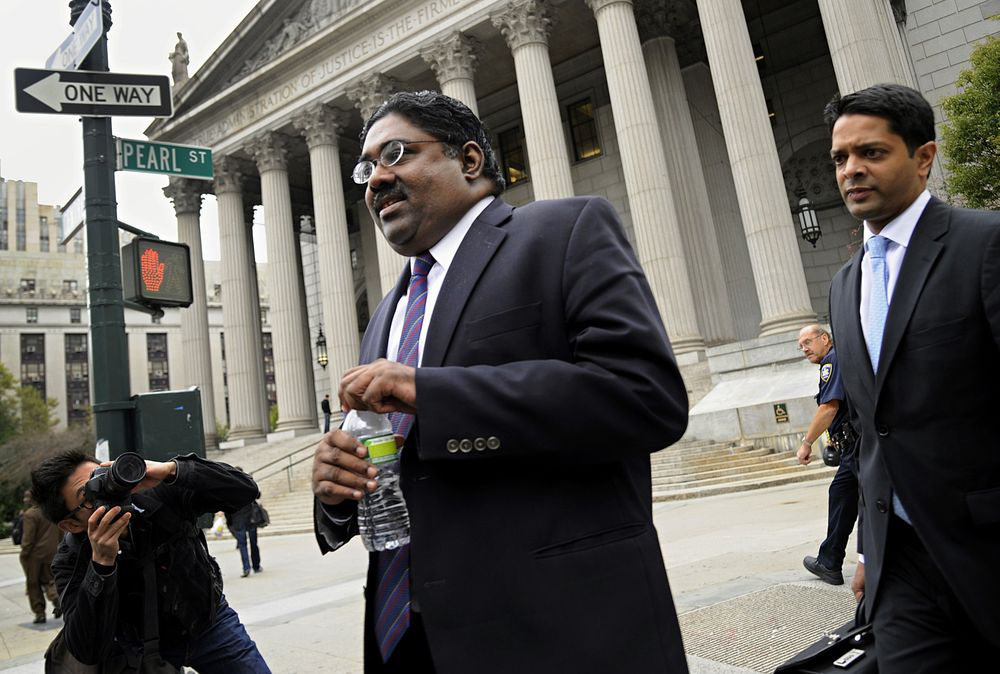September, 9, 2019

Bloomberg - Raj Rajaratnam, the mastermind of what prosecutors said was one of the largest hedge-fund insider-trading rings in U.S. history, is out of prison -- almost two years early. And he’s been out for more than six weeks.
Rajaratnam, whose Galleon Group LLC once managed more than $7 billion, has been living with his family on a quiet block of Manhattan’s East Side since July 23, according to the Federal Bureau of Prisons. He’s mostly confined to his apartment for the remainder of his sentence, but is free to work outside his home during the day.
Sentenced to 11 years behind bars after his 2011 conviction, he served his time at the Federal Medical Center Devens, a prison outside Boston. Rajaratnam, 62, is a beneficiary of the 2018 First Step Act, which allows some federal inmates who are over 60 years old, or who face terminal illnesses, to serve the end of their sentences at home.
The native of Sri Lanka became a billionaire after co-founding Galleon and was perhaps the highest-profile figure ensnared in a years-long crackdown on insider trading at hedge funds. Arrested in an early-morning FBI raid in October 2009, he was in the first wave of defendants charged by federal prosecutors in New York, with dozens of other traders, executives and company insiders accused in the years that followed.
The move from prison wasn’t announced by the U.S. Bureau of Prisons or by Rajaratnam’s legal team, and only became apparent after his location on the bureau’s public website was changed from Devens to “New York RRM,” an administrative unit that oversees inmates in halfway houses and on home detention.
Rajaratnam was due to be released on July 4, 2021, according to the BOP website. More than 240 applications for home confinement for “elderly offenders” have been granted under the First Step Act, according to the bureau. Rajaratnam isn’t required to wear an electronic-monitoring device to keep tabs on his location, according to a person familiar with the arrangement who asked not to be named. It’s unclear if Rajaratnam is now employed.
After 12 days of deliberations, a jury in New York found Rajaratnam guilty of 14 counts stemming from a seven-year plot to trade on inside information from corporate executives, bankers, consultants, traders and other insiders. Among his tipsters was Rajat Gupta, then a board member at Goldman Sachs Group Inc., who later went to prison for leaking secrets to Rajaratnam. Prosecutors said Rajaratnam earned more than $72 million from the illicit tips.
Rajaratnam was defended by John Dowd, a Washington lawyer who went on to represent President Donald Trump during part of Special Counsel Robert Mueller’s inquiry into Russian meddling in the 2016 election.
Galleon was among the world’s 10 biggest hedge funds in the early 2000s. Rajaratnam’s net worth of $1.3 billion made him the 559th richest person in the world, Forbes Magazine said in 2009.
The prosecution was one of the first insider-trading cases built on wiretapped telephone conversations, a tactic that until then was associated with organized-crime investigations. Jurors heard more than 40 recordings of Rajaratnam, in some of which he could be heard gathering secrets from his sources.
Rajaratnam’s 11-year sentence was one of the longest in the insider crackdown. At Devens, he was one of 1,055 inmates in a facility surrounded by razor-wire fencing, with a perimeter patrolled by armed officers. Like most federal prisoners, he was eligible to earn a sentence reduction of as much as 15% for keeping a clean disciplinary record, meaning he may have gotten more than a year shaved off his term for good behavior.
The prison’s focus is on men who need specialized or long-term medical or mental health care, according to the BOP. In court papers filed before he was sentenced, Rajaratnam said he had health problems including diabetes.
Yet even in prison, he defended his name. Two years ago, he sued an informant for the Federal Bureau of Investigation and a former agent, claiming they falsely linked him to terrorism when they talked to a Vanity Fair reporter. He also brought legal challenges to his conviction. They were unsuccessful.
In a lawsuit brought by the U.S. Securities and Exchange Commission, Rajaratnam was ordered to pay $93 million in civil penalties, while the judge in his criminal case required him to forfeit $54 million and pay $10 million in fines.
Along with Rajaratnam and Gupta, then-U.S. Attorney Preet Bharara’s legal attack on Wall Street targeted Steve A. Cohen’s SAC Capital Advisors, which pleaded guilty to insider charges, executives from expert-networking firms who spilled secrets, and even professional gambler Billy Walters, who is serving time for his own illicit trading.
Photo - Raj Rajaratnam in 2011. Photographer: Peter Foley/Bloomberg
Video Story